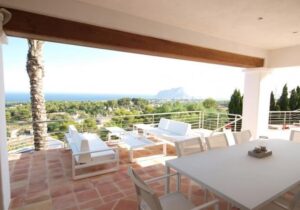Buyer’s Guide Spain

THE LEGAL SIDE OF BUYING A PROPERTY IN SPAIN
Purchasing property in Spain is as safe as buying a property in your own country as long you take the right professional advice; however, you should proceed with caution. The buying process is very different from the way of your own country. You should always engage the services of an independent lawyer that has not been recommended to you by the selling estate agent. If you are purchasing the property without a mortgage, you should also consider having the property valued independently and not rely on the valuation set by the selling estate agent.
WHY BE CAUTIOUS
Over the past 30 years, thousands of nationals have purchased property in Spain. Unfortunately, this has given rise to many unscrupulous practices by developers, lawyers and estate agents. Such practices have been highly publicised in newspapers and on television. For example, where properties have been illegally built without planning permission and now may have to be bulldozed, leaving the current owners without any compensation.
Properties are registered very differently to procedures in your own country The title deeds in Spain, known as the escritura, are very detailed. They describe the property in great detail to the exact square foot, quoting the number of rooms, patios, pools and even barbecue areas. If the property is not correctly registered this could mean that parts of the property are illegal and have been built without planning consent.
While in the past this may not have been a problem at resale, today buyers are more informed and often require mortgages. Banks are only prepared to lend on correctly registered titles.
ESTATE AGENTS
There are many reputable estate agents in Spain who are licensed by the Agente de la Propiedad Inmobiliaria (API) or by the Gestor Intermediario en promociones de Edificiones (GIPE). They can provide an experienced guide to the area in which they operate. The estate agent may be able to recommend architects, surveyors, banks, mortgage lenders and other contacts in the area. However, this is a de-regulated industry in Spain, so almost anyone can broker a property sale, and you should choose your estate agent with care.
LAWYERS
To purchase a property in Spain you do not have to use a lawyer to represent you at the completion meeting, which is held in front of the public notary. The role of the notary is to ensure that you understand what you are signing. They are not there to check that the property you are purchasing is legal and correctly registered. If an estate agent agent tries to talk you out of using a lawyer or using their recommended firm this may be an indication that there are problems with the property.
There are lawyers in Spain who are aware of the issues and differences between your country and Spain and so can explain the process in terms you understand and guide you expertly through the process. The lawyer in Spain is called an abogado/a.
VALUATIONS
When visiting a property, the valuer carries out a number of measurements and searches in order to establish the value of the property. The valuation report points out the legality of the property in accordance with current legislation. Under Bank of Spain rules, the valuer can only value what is recorded on the esritura, so if the property has been extended and the extension has not been properly recorded, it cannot be included in the valuation.
The valuation will be checked against the escitura by your lawyer to ensure that the property is correctly registered.
It should be noted that estate agents generally provide an optimistic appraisal of the property in order to secure the sale.
The value of rustic properties will usually be lower than that of urban properties. Spanish valuers will for the most part have a different view from that of foreigners. For many people, the thought of owning a villa in the countryside with open views and nothing in the vicinity to cause noise and disturbance is part of their dream. The Spanish viewpoint on the other hand is generally that nobody in their right minds would want to live out in the middle of nowhere with no main roads, shops and amenities, hence the reason for low land prices in rustic areas.

THE SPANISH NOTARY (NOTARIO)
The notary is a public official; their duties are similar to those of a solicitor, but the notary is concerned solely that the legal requirements have been met in full. The notary has no responsibility to either party, and will not usually advise you on your purchase, but is responsible for checking that the papers are correct and that certain government regulations have been satisfied, including in certain cases the payment of taxation.
As a purchaser you should therefore always ensure that you have an independent lawyer acting on your behalf, and not that of the seller. The buyer’s solicitor will check the title and take care that there are no arrears of electricity, community fees, taxes and so on (this is very important, as the buyer effectively takes over the seller’s unpaid local taxes, including interest and penalties due). The lawyer acting for you should also explain everything to you in your own language, and therefore it is helpful (or essential) to have a lawyer who speaks your language and who specialises in Spanish properties.
For a new property, your lawyer should check at the town hall that the developer has obtained legal planning permission.
The key document in Spain is called the escritura, which is the deed of the title and must be approved and witnessed by the notary before it can be registered.
It is very important that your title to the property is registered in the public registers in Spain. If it is not, then you could have considerable legal difficulties later.
The main register is known as the registro de la propiedad. It is usually far better for you to have the escritura translated from Spanish so that you can understand it in full.
Once the property has been registered, the escritura becomes an escritura publica, which is the formal publicly registered title deed. Only when you have this paper can you easily prove that you are the true owner of the property.
COSTS OF BUYING
The notary’s fees are set by law on a sliding scale, depending on the declared price, the size of the property and the number of pages and clauses in the escritura. Notary fees are subject to IVA (tax) in Spain.
As a general guide, if you wish to avoid detailed calculation, allow up to 0.5 per cent of the declared price. If you are taking out a Spanish mortgage, notary fees (and IVA) will also be due on the mortgage, depending on the amount.
If you have asked the notary to do any additional work over and above the transfer title to the property, or provide any advice, there will be additional charges.
Also, you must have your Spanish will prepared by a Spanish lawyer, or other legal representative, which must be signed in front of a notary. Your lawyer will be present at the signing of the will at the notary’s office to ensure that you have fully understood the details of the will before signing. In some instances, a legal or fiscal agent will carry out this function.
Once the will has been signed, the original will be kept in a central (will) registry in Madrid and you will be given a copy for safe keeping; there should be additional charges for this service.
ITP
On buying resale property or a property from a private individual, you will have to pay transfer tax known as Impuesto sobre Transmisiones Patrimoniales (ITP) of six to seven per cent of the value declared in the contract. The rate varies in different parts of Spain.
IVA
IVA (Impuesto sobre el valor ariadido) at seven per cent is payable on new build residential properties (e.g. acquired from the developer), or resold, unregistered properties (i.e. an off-plan property acquired from another individual prior to being registered). Commercial properties and car parking spaces are subject to IVA at 16 per cent.
Plots of land are subject to IVA at 16 per cent, but if you commence building a residential property on land, you can reclaim some of the IVA paid, bringing the IVA rate down to seven per cent.
There is no IVA in the Canary Islands, instead a sales tax (the IGIC) of around five per cent is levied.
STAMP DUTY
Stamp duty (Impuesto sobre Actos Juridicos Documentados, AJD) is payable at between 0.5 per cent and one per cent (dependent on the region). IVA should be added to this figure as well, if you purchase the property with a Spanish mortgage. Further AJD and IVA will be due on the amount of mortgage in addition to the amount due on the property.
LAND REGISTRATION FEES
Finally, there are land registration fees, which are about the same as the notary’s fees, and are chargeable according to the property price. If you purchase the property with a Spanish mortgage, this will also have to be registered, and a further charge will be payable for this.
MORTGAGE AND OTHER FEES
If you are taking out a Spanish mortgage, you should also budget for the arrangement fee you will have to pay the Spanish lender. Spanish lenders normally charge a fixed arrangement fee of one per cent of the mortgage amount. However, some lenders may cap) the amount payable to an agreed limit or may be willing to offer a discount if the amount you are borrowing is considerable.
You should also bear in mind the cost of your currency, and of any transfers of funds between your country and Spain. A reputable currency broker will be able to advise you regarding this matter, and will probably be able to offer you a better rate of exchange than your own bank. They may even be able transfer Euros to a Spanish bank account for less than your bank.
INSURANCE
Do not forget to insure the property and its contents. If you are using it as a holiday home (or intend to let it) ensure this is declared to the insurance company, as failure to do so may invalidate the policy. You should also check the policy if it is for a holiday home, to see what risks are covered, as some insurance companies will not cover for say flood or fire if the property is unoccupied for more than 30 days at a time.
If you are intending to let out the property, this should also be declared, as again failure to notify the insurance policy may invalidate the policy if damage occurs while the property is let.
A good guide to calculate the extra costs of purchasing a property in Spain is to add 10% to the purchase price. This should cover all the additional costs you have to pay.
